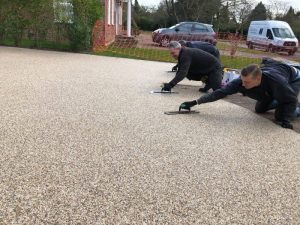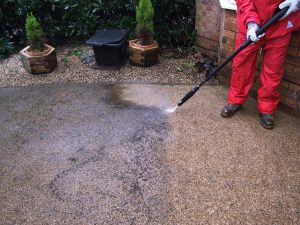It takes a lot of planning and dedication when you renovate larger parts of the house such as the garden or your living room. However, homeowners sometimes forget there is another part of their property which is just as important as the rest of the house and that is the driveway. When your family and friends come over to your house, the first thing they see before going in is your driveway. Therefore, not only does the driveway leading up to your front door need to be easy to walk, but it should also fit the appearance of your house. If you decide to repair your driveway and give it a fresh new look, there are so many options you can choose from. A particular driveway surface which has become more popular over the years is resin. In this post, we will be talking about the most important things you should know including the cost, the installation process and the benefits of having a resin driveway surface.
How much does it cost?
Before engaging in this new home improvement project, you must take into consideration the entire resin driveway cost. Just like any other driveway surface, the cost of installing a resin one depends mostly on the size of your driveway. The average price range for this type, accommodating one car is somewhere between £1300 and £1800. Of course, the price rises as the number of cars you want to fit in your driveway changes. Also, within the price of installing a resin driveway surface, there are other additional costs you must have in mind. Some include whether you are removing the current driveway, whether you are installing a gate and of course the labour of it all. The time frame for installing this driveway is about a week, however, that can vary depending on the size. Make sure you gather all the information you need about the cost of installing this surface so you are well-prepared before actually diving into the project.

Types of resin installations
There are two types of resin installations and these are UV-stable resin and non-UV-stable resin. It is important to choose the right one that is more suitable for your driveway in order to produce a beautiful surface, and to go with a good provider such as Resin driveways. UV-stable resin includes a variety of decorative aggregates which don’t fade. It is very easy to install and it requires low maintenance. It is also resistant to water and weeds. On the other hand, non-UV-stable resin is slightly cheaper. Since the UV-stable resin is cured with a UV lamp, non-UV-stable resin can be applied in small areas where the lamp cannot access. However, its major drawback is that the resin can darken when it is exposed to sunlight. Whichever type of material you choose for your driveway surface, make sure you find out about the advantages and disadvantages of each so you can avoid any future troubles.
How to install a resin driveway
The installation of a resin driveway must be done correctly from start to finish. So, before you begin, the first thing you need to think about is whether the surface is suitable for this driveway surface. In other words, it must be in good shape and free from contamination. Suitable bases for a resin driveway include macadam, asphalt and concrete. Other things you should consider are weather conditions. You shouldn’t try your luck if rain is in the forecast during and after the completion of the surface. Also, double-check to make sure that you have all the necessary materials and protect the work area to avoid resin staining. Even though laying this kind of driveway is a simple process, don’t skip the steps because accuracy is very important at each stage.

Once you have done these checks, the installation can begin. First, you need to mix the resin with the dried aggregates and sand. Add them bit by bit so the resin is mixed properly with the other aggregates. This is important to do correctly because if you notice too many dry stones during the laying out phase, then you need to keep mixing. Then, transfer the material to the work area. Make sure you put equal amounts ensuring that the mix is spread out evenly. If any marks occur during this stage, you can easily fix them. The last step is levelling out the mix with a shovel or trowels in order to create a smooth finish. The area should be left for a couple of days before parking or even stepping on it.
Benefits of a resin driveway
One of the biggest advantages of a resin driveway is that it can be used for different surfaces such as patios, parks and schools. It is available in many colours making it a great option for any type of surface. It provides a smooth, long-lasting finish due to the top layer which can handle heavy vehicles and extreme weather conditions. Because of its durability and resistance to water, it minimizes puddles, ice and growth of weeds. Another big advantage of a resin driveway is that it requires low maintenance. All you can do is hose it down and sweep it off. If the resin driveway surface is done correctly, then it can last up to 25 years. These are the reasons that make this type of driveway surface so unique compared to other materials.

Final thoughts
There are many materials you can choose from for your driveway surface, but so far the resin one seems to be a hit. This surface is very durable and water-permeable which is extremely important to keep in mind. The fact that it is available in multiple colours just means that you can have an innovative design by creating patterns and shapes. Lastly, make sure you follow and complete each step correctly in order to have a beautiful driveway that will be the talk of the neighbourhood.








